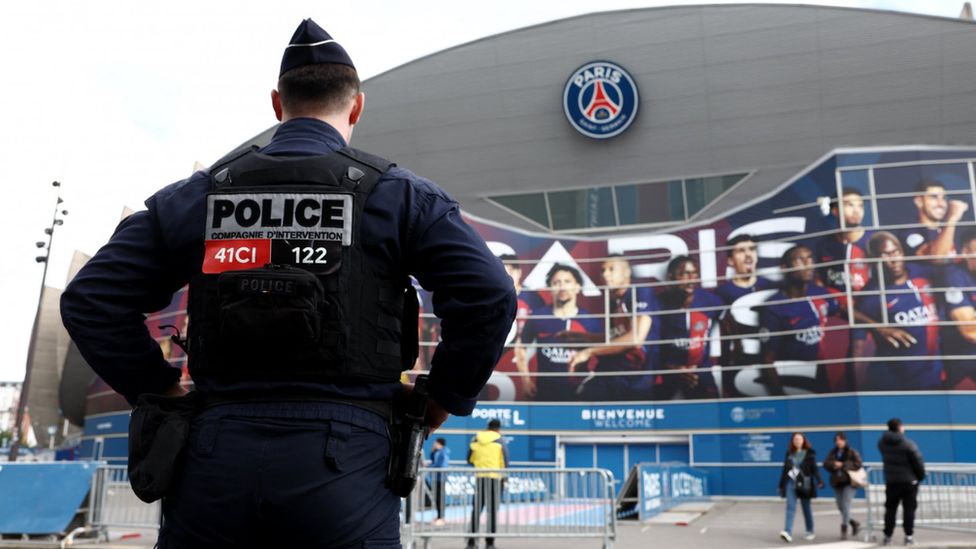 Image source, Reuters
Image source, Reuters
France has strengthened security around the Parc des Princes ahead of Wednesday's Champion's League quarter-final
By Andrew Harding
Paris correspondent
Under clear blue skies, extra French police have been making a show of force around Paris today, on foot patrol at railway stations and near stadiums, seeking to reassure the public amid new warnings that the Islamic State group might be planning to attack European football events.
The heightened security in the French capital marks a moment of growing concern across Europe, as governments seek to assess, and react to, threats made on a pro-IS media channel.
It also comes at complicated moment for France itself, as it prepares to host the Olympic Games in July following growing concerns that the Kremlin is deliberately trying to spread doubts and fears about the French government's ability to keep its citizens safe.
Interior Minister Gérald Darmanin said he had "considerably strengthened security" around Wednesday night's Champion's League quarter-final match at the Parc des Princes in southwest Paris.
The move follows an online threat to European sporting events that Mr Darmanin said had been "publicly expressed" by IS. The pro-IS media channel had reached out to supporters in France and elsewhere, who may feel emboldened after seeing the recent IS-claimed attack on a concert hall in Moscow.
Image source, EPA
Image caption,Close to 150 people died in the attack on Moscow's Crocus City Hall music venue - an attack claimed by IS
But Mr Darmanin was keen to put the threat, and a raised national threat level, in context, stressing that the risk of an IS attack was "not new" and that "I don't have - and I say this quite frankly - any specific information. We don't know which location might be particularly affected, nor under what conditions".
He also pointed out that his forces, with long experience of tackling Islamist extremism, had foiled two attacks since the start of the year and arrested five individuals in three different cases in the past fortnight.
Two fans who had come from Toulouse ahead of the PSG-Barcelona match, were quick to brush aside the risks.
"We live constantly under the threat of terrorists and attacks so we have not stopped ourselves from living and coming to a superb match even after these threats," said Julien, 21.
BBC/Marianne Baisnée
You have to be vigilant but there is no reason to be more afraid than usual
"We must not be afraid," declared Alexandre. who's 27. "If they are doing this communication campaign, it is above all to scare us and terrorise us, so that the French no longer go out. So we must continue to live, and show them we are stronger than that."
But across Europe, with a long summer of sporting and cultural events ahead, governments are expressing growing concern about IS-K, as the jihadist group's Afghanistan-based wing is known.
Germany now calls it the country's biggest internal threat and is increasing security ahead of this summer's European Football Championship, including the rare step of introducing land border checks.
In recent months there have been police raids targeting IS-K supporters in Germany, Belgium and Austria and reports by police of foiled plots, for example against Cologne Cathedral on New Year's Eve.
Image source, EPA
Image caption,German police managed to stop what they said was a planned attack on Cologne Cathedral on New Year's Eve
But finding the right balance between security preparations and public reassurance is never easy, and France faces some particularly tricky challenges with the Olympic Games due to begin with an unprecedented opening ceremony along the river Seine in the heart of Paris in little more than 100 days.
The right-leaning French newspaper, Le Figaro, has already warned that too much attention is being given to IS threats, claiming that "the propagandists of the Islamic State have already achieved part of their objective".
French security expert Guillaume Farde argued that it was important for a democracy like France to be seen not to be cowed, otherwise "we are playing the game of terrorist organisations who want to establish a climate of terror, a climate of distrust".
France has experienced many devastating Islamist incidents in recent years, from the Charlie Hebdo killings of 2015, the Bataclan attack of the same year, the Bastille Day murders in Nice in 2016, and a series of brutal murders of teachers.
The authorities have responded with Operation Sentinelle, a military force focused on protecting people from terrorist threats. Twenty thousand soldiers will be involved in securing the Olympic Games in Paris, alongside some 40,000 police and gendarmes.
But the war in Ukraine has added a new dimension, with President Emmanuel Macron warning that Russia now presents "a risk" to the Olympics.
Image source, Getty Images
Image caption,President Macron, seen here on a visit to Ukraine, has warned that Russia represents a threat to the Paris Olympics this year
President Macron has taken an increasingly tough line with the Kremlin, which appears to have responded with an aggressive cyber-campaign designed to discredit France at every opportunity.
"I'm not going to link Russia with jihadist terrorist organisations. On the other hand, Russia is attempting other destabilising actions," said Guillaume Farde, citing examples of online cyber-trolling networks, linked to Russia, seeking to spread false information and to amplify "bad news".
The French defence ministry, for example, recently took the rare step of publicly denouncing a fake, copy-cat version of its own official website, which appeared to invite 200,000 French people to "get involved" in Ukraine.
Analysts believe it is part of a broader Kremlin-backed campaign to weaken Western support for the Ukrainian war effort.












 English (US) ·
English (US) ·  Turkish (TR) ·
Turkish (TR) ·